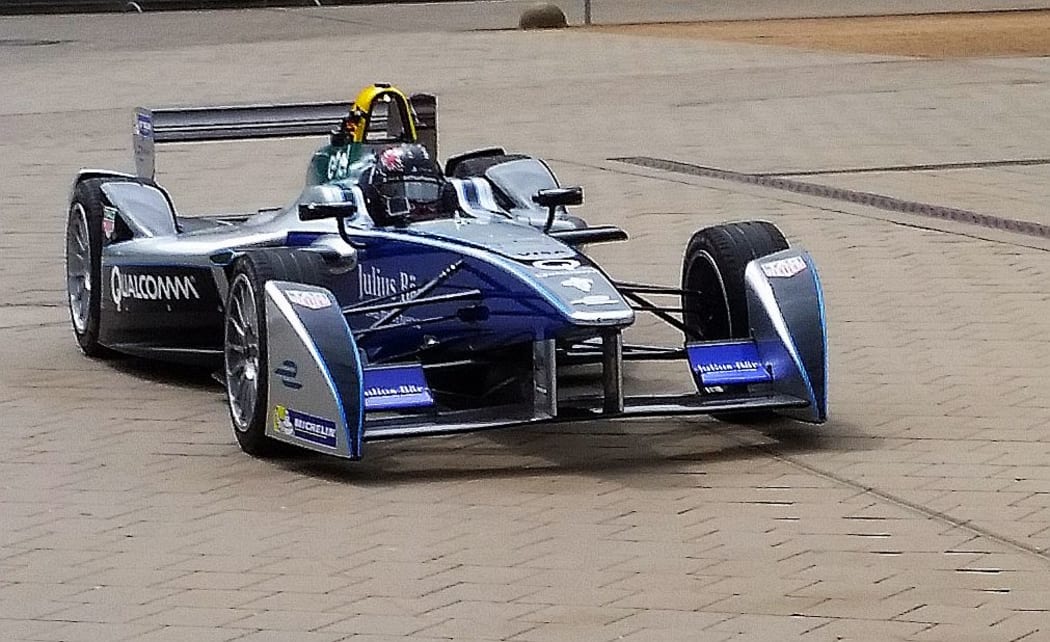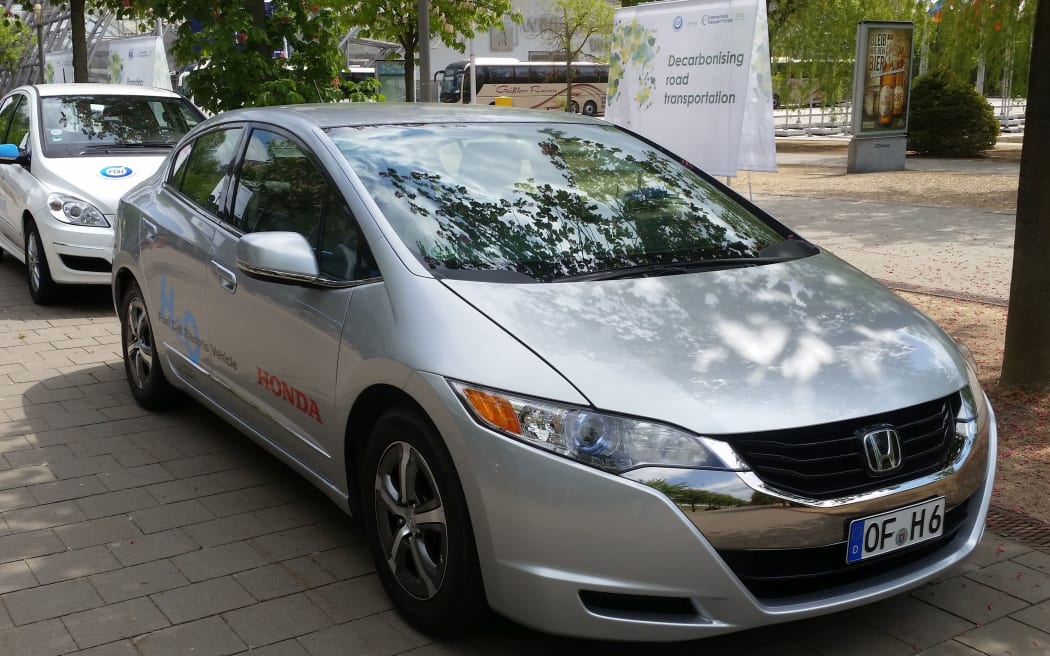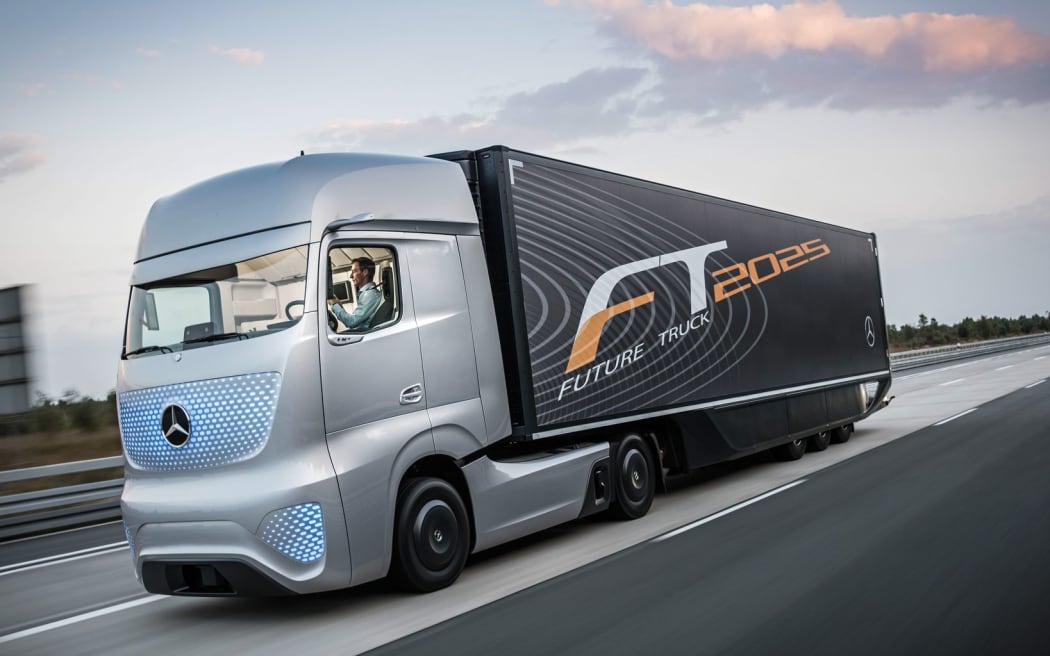People in western countries are constantly being told they are consuming too much, their environmental impact is too great, and their behaviour is hastening the risk of catastrophic climate change.
Are transport technologies that could avert a global crisis finally coming within reach - and will we grab them if they are?

An electricity-powered racing car - will it one day replace fossil fuel drenched Formula One? Photo: RNZ / Eric Frykberg
For two years now, electric cars have sped around racing circuits in what is called Formula E.
For Formula E chief executive Alejandro Agag, the future appears bright.
Teams like McLaren and Williams were helping to build electric racing cars, and big names heading the teams included Audi and Sir Richard Branson's Virgin Group, he said.
His cars were far cleaner than those in Formula One, but in other respects they had a lot in common, he said.
"The acceleration of electric cars can compare perfectly with the performance of any other category of racing cars... Zero to a hundred in about 2.9 seconds.
"We could go 250 to 260 kph in this car, we usually race it at 220, so performance is very high for the streets of the cities where we race."
Electric cars had the same future as other forms of mobility and would be the main form of car racing once most ordinary road cars were also electric, Mr Agag said.
But Formula One won't give up its leading status without a fight - not according to the man who is in charge of it worldwide, French automotive supremo and former rally driver Jean Todt.
He said he admired Formula E a lot, but it would not replace Formula One.
"We are talking about two different things. Will basketball replace soccer? Will rugby substitute for football? I don't think so. So there is no reason why Formula E should replace Formula One."
The argument over Formula E, and the size and shape of its potential impact, is just one example of the ongoing global debate over the environmental impact of transport.
As long ago as 2010, WWF warned that if everyone on earth had the same consumption levels as the average Briton, 2.75 planets would be needed to sustain them.
But what if over-consumption, including of relatively environmentally costly transport methods, is a bad habit that people just can't kick - worse than tobacco, or booze for an alcoholic?
Across the world, hard-headed business leaders are taking that human failing for granted, and assuming human nature will not change.

The Honda FCX Clarity is promoted as an example of another green technology: the hydrogen, or fuel cell, car. Photo: RNZ / Eric Frykberg
The transport industry, given its role in the increase in greenhouse gases, is at the forefront of the movement to drive change through technology.
It generated 23 percent of global CO2 emissions from fuel combustion in 2013, and that rate is forecast to grow.
Its leaders are conscious of the need for change, and they gathered last month for the International Transport Forum Annual Summit in the German city of Leipzig to talk about ways of doing this.
German luxury car maker BMW has emerged as one of the companies leading the race to build a new generation of vehicles, with electric cars already in production and plans to unveil a driverless car by 2021.
Porsche, Audi and Renault are also at the front of the pack in Europe, and are competing with other challengers based in the US.
One of the stars of green travel, who spoke in Leipzig, is JB Straubel - the co-founder and chief technical officer of Californian electric car company Tesla.

JB Straubel Photo: Supplied / International Transport Forum
He told his audience there was no point in rejecting technology in an effort to reduce its negative effects - instead, he wanted to embrace technology in order to give people mobility with a low environmental impact.
Some journalists and researchers have suggested Tesla's electric vehicles are not as green as they seem, due to hidden environmental impacts. For example, depending on where they are used, they might run on electricity generated by fossil fuels.
Mr Straubel said his company's electric cars were proving very popular, and he rejected that criticism.
"The environmental footprint, whether it is the CO2 or raw energy needed to create the battery or the unique elements of the car, are offset by the cleaner operation of that car," Mr Straubel said.
"That payback happens within a few thousand miles of operating the car.
"That payback is fastest if you operate the car from sustainable energy. But even if you are using fossil fuel energy [ to generate the electricity], you still see a fundamental benefit. It is more efficient to generate that electricity centrally than it is to do it in individual power plants in hundreds of thousands of cars."
These are not the only companies producing electric cars - most others have them or are working on them.

Daimler is reported to have already tested driverless trucks on a German autobhan. Photo: Daimler
Moving freight by road is another serious contributor to greenhouse gas emissions.
Improvements in efficiency here are expected to come by losing the drivers, according to International Transport Forum Secretary-General Jose Viegas.

Jose Viegas Photo: Supplied / International Transport Forum
"Driverless trucks on motorways will be ready to go within two years," he said.
Driverless trucks, like driverless cars, use sophisticated programmes, satellite navigation and hazard detectors such as radar. Manufacturers argue they can operate safely, reliably and, perhaps most importantly, pretty much without pause.
Mr Viegas said economics would make them inevitable.
"The driver represents 50 percent of the cost, and it restricts the truck operation to eight hours a day. If you have no driver, the cost is half and the reach is three times longer.
"It is a massive game changer and if your company has this technology available and mine hasn't, and we are in the same market, two months later I am out of the game."
Driverless cars were also discussed in Leipzig, as were shared cars, as a way of reducing the total number of cars in use in any given town, and reducing transport's environmental impact while doing the same amount of work.
All this was aimed at finding a way to keep society going the way it is now, while at the same time reducing greenhouse gas emissions to a more manageable level.
With this line of thinking, the better use of technology is the only practical way forward.
However, not everyone thinks this argument stands up.
WWF New Zealand head of campaigns Peter Hardstaff said there was no single solution - and no technological silver bullet - for transport emissions.
"As a matter of priority, our government should be doing as much as possible to help reduce car, van and truck use and encourage walking, cycling, use of public transport and rail freight," he said.
"However, there are journeys for which these options are not practical, so electric vehicles can make an important and useful contribution.
"WWF New Zealand supports efforts to encourage their use but does not advocate promoting electric vehicles at the expense of, or instead of, other measures."

